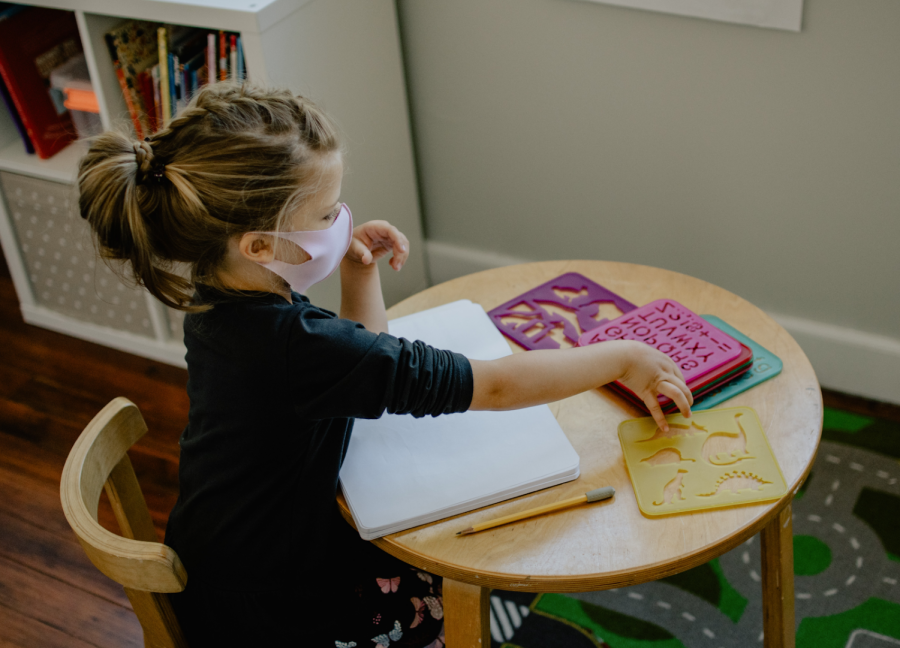The Effects of the Coronavirus Pandemic on Young Children
Though the vast majority of small children are not facing the brunt of the immediate health effects of the Coronavirus pandemic, the consequences of the crisis may follow them for years to come.
During the Coronavirus pandemic, many young children worldwide must adjust to learning in their home environment.
When the world first went into lockdown due to the Coronavirus pandemic in March 2020, many people expected it to be a short interruption from their normal routine. However, as the year dragged on, it became clear that the new lifestyle changes were here to stay. Adjusting was not easy, and some struggled more than others. For small children, the effects of a prolonged period of fully remote learning may last for years.
It is difficult to determine to what extent the circumstances will affect the futures of children; however, researchers theorize that it may hinder their growth and development and take a toll on their mental health. In an interview with the nonprofit organization DirectRelief, pediatric doctor Michelle Aguilar said that without exposure to environments outside the home, “children are not getting the cognitive and social stimulation that they would normally get…They’re lacking from those social interactions that they would have normally gotten from people outside their homes. They’re lacking that play time with other children.”
Though everyone has struggled with the limitations on social interaction due to safety restrictions imposed by the Coronavirus pandemic, these changes are especially significant for children under the age of eight. During these formative years, children undergo crucial cognitive and social development. Given that many students across the world are currently pursuing fully remote learning in the interests of safety, it makes it difficult for children to gain exposure to in-person learning environments where they can develop their skills.
“My younger sister Amy is 6. She’s definitely not getting as much social interaction as she would be, if she was attending in-person classes. She’s also had a bit of difficulty sitting through online classes since the lessons aren’t as engaging,” Kevin Liu ’24 said. Online lessons, though a necessary measure, cannot fully replace in-person classes. Content such as basic math and reading can be taught online, but skills such as sharing and appropriate behavior toward peers are more challenging to teach through a screen.
In addition, since they are not receiving the same amount of social interaction, many children have become lonelier. This is frightening because, according to a study published in Archives of Disease in Childhood, loneliness in children can be linked to health problems such as depression. The state of a child’s mental health is extremely influential on the person they become later in life and often has a lasting impact on the child even in adulthood.
Loneliness is unfortunately not the only problem associated with the Coronavirus pandemic. Current events have made it difficult for many families to maintain previously established routines because the pandemic and need for social distancing has so greatly impacted lifestyles. As stated on healthychildren.org, “Children do best when routines are regular, predictable, and consistent.” Routines are often difficult to keep up with nowadays since circumstances are constantly changing and both adults and children alike are under more stress. This may also lead to certain milestones, such as birthdays, not being celebrated as they would usually be, to the disappointment of many. Over time, this can lead to a decline in the child’s overall mental state and happiness.
In light of this, families have done their best to mitigate the situation in various ways. To compensate for the lack of in-person lessons, Liu said, “My parents have been trying to keep her on the right track with workbooks. My mom tries to sit down with her and tries to get her to read after work sometimes. In addition, my parents also try to get her to talk about what she learned every day to help her develop communication skills.”
The CDC has provided a general guide for parents of young children, which gives an overview of some of the methods parents can use to help their children face certain challenges brought on by the Coronavirus pandemic. In particular, they state that it is important to keep open lines of communication between parents and children — though they may not fully understand everything happening in the world, many children may still experience fear because of it all. As such, allowing children to express their thoughts and feelings gives parents the opportunity to better connect with their children and educate them.
With the current state of the world due to the ongoing COVID-19 pandemic, it is difficult to raise a child, but it is important to do our best now more than ever. The future rests in their hands, so we should do our best to make sure they have what they need to build a promising one.
“My younger sister Amy is 6…she’s definitely not getting as much social interaction as she would be in in-person classes. She’s also had a bit of difficulty sitting through online classes since the lessons aren’t as engaging,” Kevin Liu ’24 said.
Katrina Tablang is a Copy Chief for 'The Science Survey.' She enjoys journalistic writing because it enables her to explore a wide variety of perspectives...











